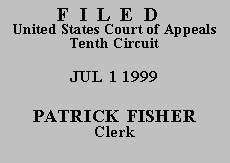

| RUSSELL J. DIEFENDERFER, |
|
| v. | |
| OFFICE OF RECOVERY SERVICES FOR THE STATE OF UTAH, Offset Coordinator, Robert Jowery; COMMONWEALTH OF PENNSYLVANIA, Dauphin County Domestic Relations Section, Child Support Offset Coordinator; SANDRA L. CASTANEIRA; COMMUNICATIONS AND POWER INDUSTRIES, Patty Johnson, Payroll Manager; ROBERT G. JOWETT aka Robert Jowery, |
Before ANDERSON, KELLY, and BRISCOE, Circuit Judges.
This litigation concerns Russell J. Diefenderfer's challenges to wage garnishments enforcing a child support obligation arrearage. In 1983 the State of Washington ordered Diefenderfer to pay $100 per month in child support. Diefenderfer's parental rights were involuntarily terminated in Pennsylvania in 1988. In 1992, Utah's Office of Recovery Services (ORS) received a Uniform Reciprocal Enforcement of Support Act request from Pennsylvania to collect $4250 from Diefenderfer, who was residing in Utah. Diefenderfer challenged the garnishment of his wages, both before the ORS and in Utah state court; that litigation was dismissed in February 1994.
Diefenderfer filed this 42 U.S.C. § 1983 action on November 25, 1996. The district court, in an order adopting the magistrate judge's report and recommendation, dismissed the case as to all defendants. As to defendants the State of Utah, Office of Recovery Services (ORS), Robert Jowett(1) (of the ORS), and the Commonwealth of Pennsylvania, it held that the Eleventh Amendment provided immunity. It held that defendant Mary Rider was never properly served. It held that Diefenderfer's pleadings failed to state a claim against defendants Communication and Power Industries (CPI) (Diefenderfer's then-employer) and Patty Johnson (payroll manager), because neither had acted "under color of state law," 42 U.S.C. § 1983. As to defendant Castaneira (Diefenderfer's ex-wife), the court held it did not have personal jurisdiction.
Diefenderfer raises four issues on appeal. He first argues that the court did have jurisdiction over Castaneira, by virtue of the fact that she was "receiving benefits" from Utah and had "contracted" with Utah "for services." Appellant's Br. at 2. It appears from the record that Castaneira passed away, insolvent, in 1997; her attorney notified the district court and all parties that she was "no longer a party." See R. Vol. III Doc. 56. The district court, however, never dismissed her as a party, and its opinion makes no mention of the fact of her passing. No representative has filed an appellate brief in this court on behalf of Castaneira's estate. Diefenderfer makes no mention of the fact of Castaneira's passing in either of his briefs. In any event, even if we assume for purposes of argument that Castaneira is still properly a party, we agree with the district court and the magistrate judge that the court lacked personal jurisdiction over her. That Utah collected, at Pennsylvania's request, monies owed to Castaneira, is not a sufficient nexus to hail Castaneira into the district court in Utah. To exercise jurisdiction over Castaneira in Utah would be to violate the principle that "the defendant's conduct and connection with the forum State [must be] such that he should reasonably anticipate being haled into court there." World-Wide Volkswagen Corp. v. Woodson, 444 U.S. 286, 297 (1980).
Diefenderfer next argues that a Washington court order governs his child support obligation, not the actions of the ORS. This argument, which goes to the merits of Diefenderfer's suit, avails him nothing at this stage, given the district court's dismissal of the action on other grounds.
The third argument Diefenderfer raises is that there is federal funding of the ORS which makes it not an arm of the state for Eleventh Amendment purposes. This particular argument was not presented to the district court, and moreover, the facts alleged are nowhere supported in the record. Therefore the issue is not properly before us. See Lyons v. Jefferson Bank & Trust, 994 F.2d 716, 721 (10th Cir. 1993). Diefenderfer states that he made at least a passing reference below, but we see nothing in the record sufficient to raise the issue.
Diefenderfer's final argument is that the district court improperly dismissed the action against defendants Castaneira, CPI, and Johnson, because, he claims, each acted under color of state law by conspiring with state officials. As to Castaneira, as we have stated, there is no jurisdiction. As to CPI and Johnson, we agree with the reasoning of the district court. It is undisputed that CPI and Johnson were required by law to garnish Diefenderfer's wages; private actors who merely comply with state law are not thereby acting under color of state law. Diefenderfer's allegations of conspiracy are without substance, and are meritless.
AFFIRMED
ENTERED FOR THE COURT
Stephen H. Anderson
Circuit Judge
*.This order and judgment is not binding precedent, except under the doctrines of law of the case, res judicata, and collateral estoppel. The court generally disfavors the citation of orders and judgments; nevertheless, an order and judgment may be cited under the terms and conditions of 10th Cir. R. 36.3.
1.In his pleadings, Diefenderfer erroneously referred to Jowett as "Robert Jowery."